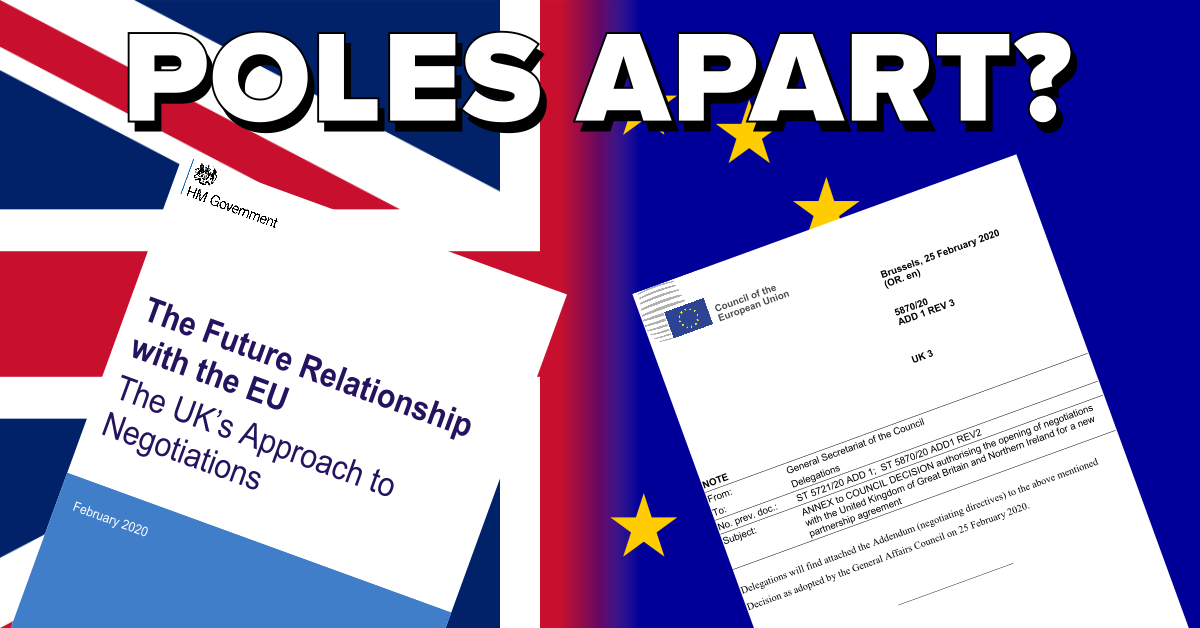
The Trade Talks Have Begun But Is There Much Scope For A Deal?
2nd March 2020
This week the UK-EU trade talks start in earnest and with the end of the transition period less than nine months away it’s not a moment too soon. The pre-match spectacle played out the previous week with first the EU then the UK laying out in detail their negotiating goals but now the real fun starts.
With the phoney war well and truly over the UK and EU negotiating teams will kick things off in Brussels and chew over the detail of their respective proposals trying find the outlines of a deal. A lot is riding on each of these negotiating rounds as the UK has reiterated that they will not extend the transition period past December 31st and should a deal not appear viable by June Prime Minister Boris Johnson has said that the UK will walk away and prepare for an orderly exit without a free trade agreement (FTA).
So is a deal even likely? Well looking at both the negotiating mandates there are actually quite a lot of areas of agreement, contrary to how it has sometimes appeared in the media. With regards to goods, services, trade facilitation, air transport, nuclear and judicial cooperation to name but a few, both sides are largely singing from the same hymn sheet however how they seek to achieve these aims is slightly differently. The UK seeks to have a flagship deal covering goods and services, along the lines of the EU’s FTAs with Canada and Japan, then have a number of separate deals covering particular issues such as fishing, road transport, judicial cooperation etc. The EU on the other hand want to have all of this covered by the one deal with its own overarching governance structure underpinned by suite of ”level playing field” measures.
Of all the potential flashpoints fishing is possibly the biggest. The UK wishes to move to a system where access to British waters is negotiated on a yearly basis and the limits determined “based on the principle of zonal attachment, which better reflects where the fish live” similar to Norway. The EU on the other hand seeks to basically maintain the UK’s place in the Common Fisheries Policy by locking in current practices on access and quotas in the deal. The stakes on this discrete point are raised even further by the fact that the EU have set a deadline of 1st July to reach an agreement and both sides are poles apart.
Alongside this the EU’s insistence on level playing field provisions is another key area where they are at odds with the UK. To prevent unfair competition, the EU says, it will be necessary to apply their State Aid Rules to the UK as well as ensuring rules with respect to environmental, labour and social policy are “not reduced below the level provided by the common standards [in the EU]”. The UK, throughout its negotiating mandate in this area, makes clear that measures on state aid and regulatory non-regression with an explicit “right to regulate” in the future should be modelled on the EU’s extant FTAs. Ostensibly it appears that the the only real area of contention is state aid however wider regulation the EU’s language is ambiguous as to whether their goal is non-regression or dynamic alignment of regulations which the UK has explicitly ruled out. If rules can’t reduce below the common standard what happens when the common standard changes?
Beyond both their differences on these issues what structure the final deal could take is equally contentious. The UK wants to have a suite of agreements covering trade, aviation, judicial cooperation etc. each with their own dispute resolution mechanisms whereas the EU wants an overarching deal with its own governance structure and a role the European Court of Justice (ECJ). The UK is rather keen to avoid the latter, partly because it mirrors similar arrangements the EU has with other third countries but mainly to prevent a dispute in one area resulting in retaliatory measures in another such as the EU placing tariffs on UK goods due to a fisheries dispute for example. This isn’t an entirely unjustified reservation as the EU have recently had form on this where they refused to renew equivalence on Swiss financial services in July 2019 due to a dispute over a new framework agreement.
Along with other UK red lines such as ECJ involvement, participation in the European foreign policy and defence framework as well geographical indicators on goods it would appear a deal might be difficult to achieve. One possible compromise could be the UK moving to a pared down, all encompassing deal with standard regulatory non-regression clauses and a more complex dispute resolution mechanism based on EU FTAs where any protective measures are limited only to the area in dispute. However such a move would be predicated on solutions being found to the aforementioned sticking points and both sides are fairly steadfast in their positions at the moment.
As with all negotiations it frequently comes down to face saving. The EU and the UK aren’t that far apart in the grand scheme of things but for a viable deal it will require significant movement from both and that may be a bit too much to ask for. It goes without saying the next three months will be crucial.
